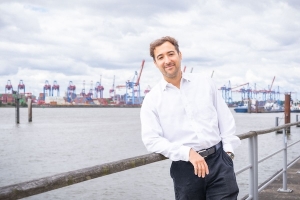


(Posted on 16/08/24)
Although having access to connectivity at sea is widely considered an important part of seafarer wellbeing, there are emerging signs of negative consequences. Mental Health Support Solutions (MHSS) has witnessed first-hand the detrimental effects of social media on seafarers' mental health, particularly among Indian seafarers, and it's time for authorities to take decisive action.
MHSS CEO and Clinical Psychologist Charles Watkins said: “The extensive use of social media is a multi-layered problem that provides users with a false sense of connectivity onboard, increasing social distance and declining mental health.”
Indian seafarers of all ages are suffering. The older demographic (25-35) feels left behind, missing important life events, while younger seafarers (20-25) experience desperation due to a lack of contact. This digital disconnect heightens the isolation felt by many and must be addressed urgently.
One issue that is becoming particularly alarming is that Indian seafarers are bombarded with misleading online portrayals of life at sea, seeing depictions of a perfect balance between work, partying, and socialising. Once the seafarers are on board, they feel that these unrealistic portrayals do more harm than good, leading to severe disillusionment and exacerbating mental health issues.
MHSS consultant Shreya Menon, a psychologist and psychotherapist based in India, highlights that many Indian seafarers go months without connectivity, missing out on vital support networks. Ms. Menon said: “I often speak with seafarers who say, ‘You didn’t tell me X, Y, or Z,’ because they’ve been misled by online representations. The reality of life onboard is often a shock especially for young Indian seafarers joining a ship and finding a very different situation than land where they are surrounded by family.”
MHSS calls on authorities to take immediate action to clamp down on misinformation and misleading footage being shared on social media. Regulatory bodies need to enforce measures that reflect the needs of the crews who keep the industry afloat and protect their mental health.
Charles Watkins added: “Regulation is crucial to ensure that Indian seafarers are not misled by idealised portrayals of life at sea. Authorities must step in to monitor and remove harmful content that contributes to mental health issues. In addition, I recommend initiatives to prepare and educate seafarers about the actual life at sea to counter the flood of misinformation and give them a better understanding of the real experience and challenges.”
AtoB@C Shipping, a subsidiary of ESL Shipping, has announced the successful delivery of Fleximar, the... Read more
Western Bulk, together with reputable Norwegian partners A/S J. Ludwig Mowinckels Rederi, Premium Maritime... Read more
Pacific Basin Shipping Limited, one of the world’s leading dry bulk shipping companies, has announced... Read more
Columbia Group anticipates a period of strong expansion as an increasing number of international shipowners... Read more
Norse?Ship Management has expanded its use of Smart Ship Hub’s high frequency sensor data and... Read more
As the maritime industry gears up to welcome the IMO’s STCW bullying and harassment training amendments... Read more
NORDEN has acquired the cargo activities of Taylor Maritime in Southern Africa (previously operated... Read more
Philippos Ioulianou, Managing Director of EmissionLink, has warned the IMO’s decision to delay... Read more
VIKAND has highlighted the need for cultural change in the maritime sector as reports of bullying, harassment... Read more
The maritime industry is experiencing a period of significant transformation, driven by rapidly evolving... Read more